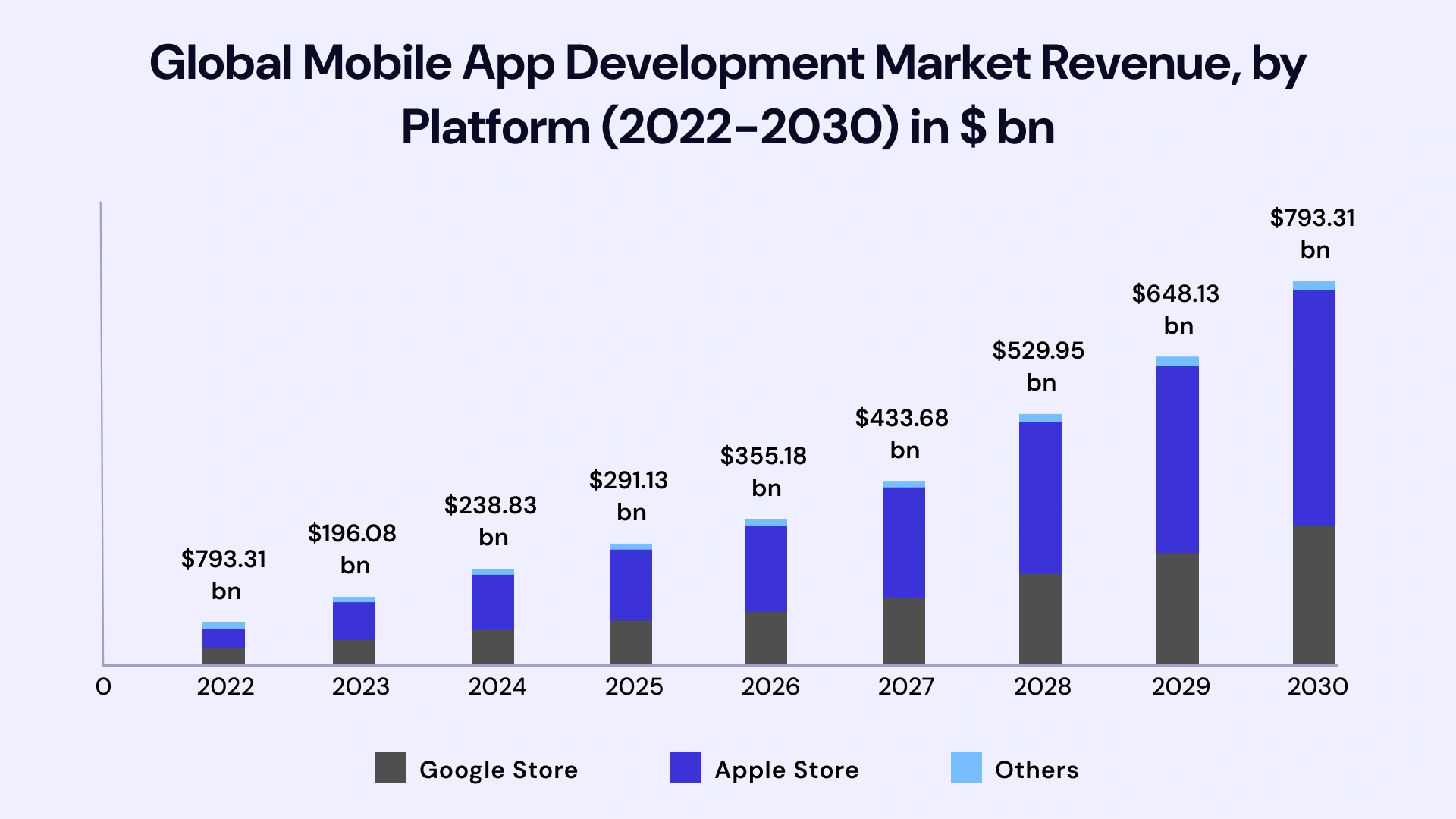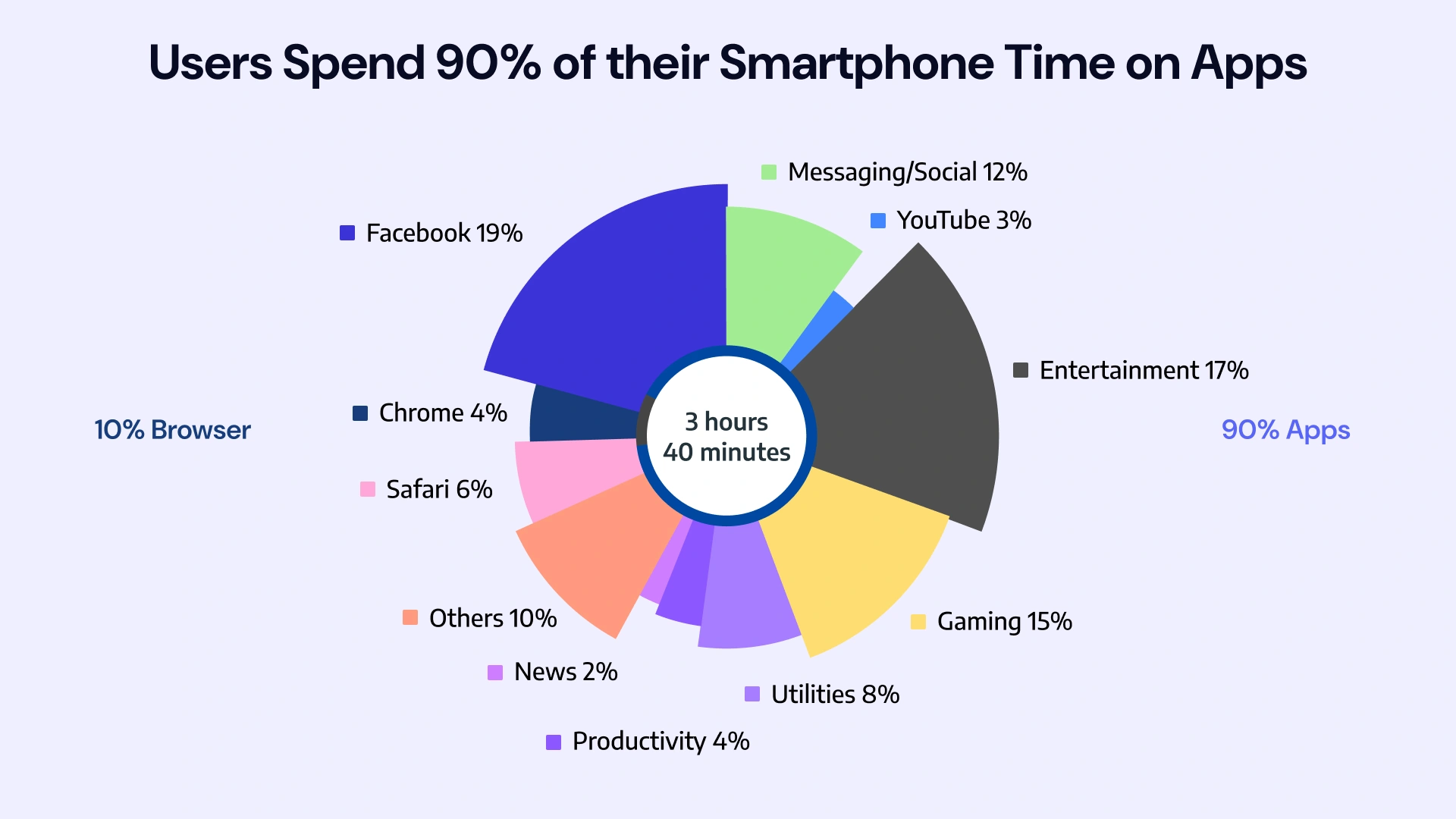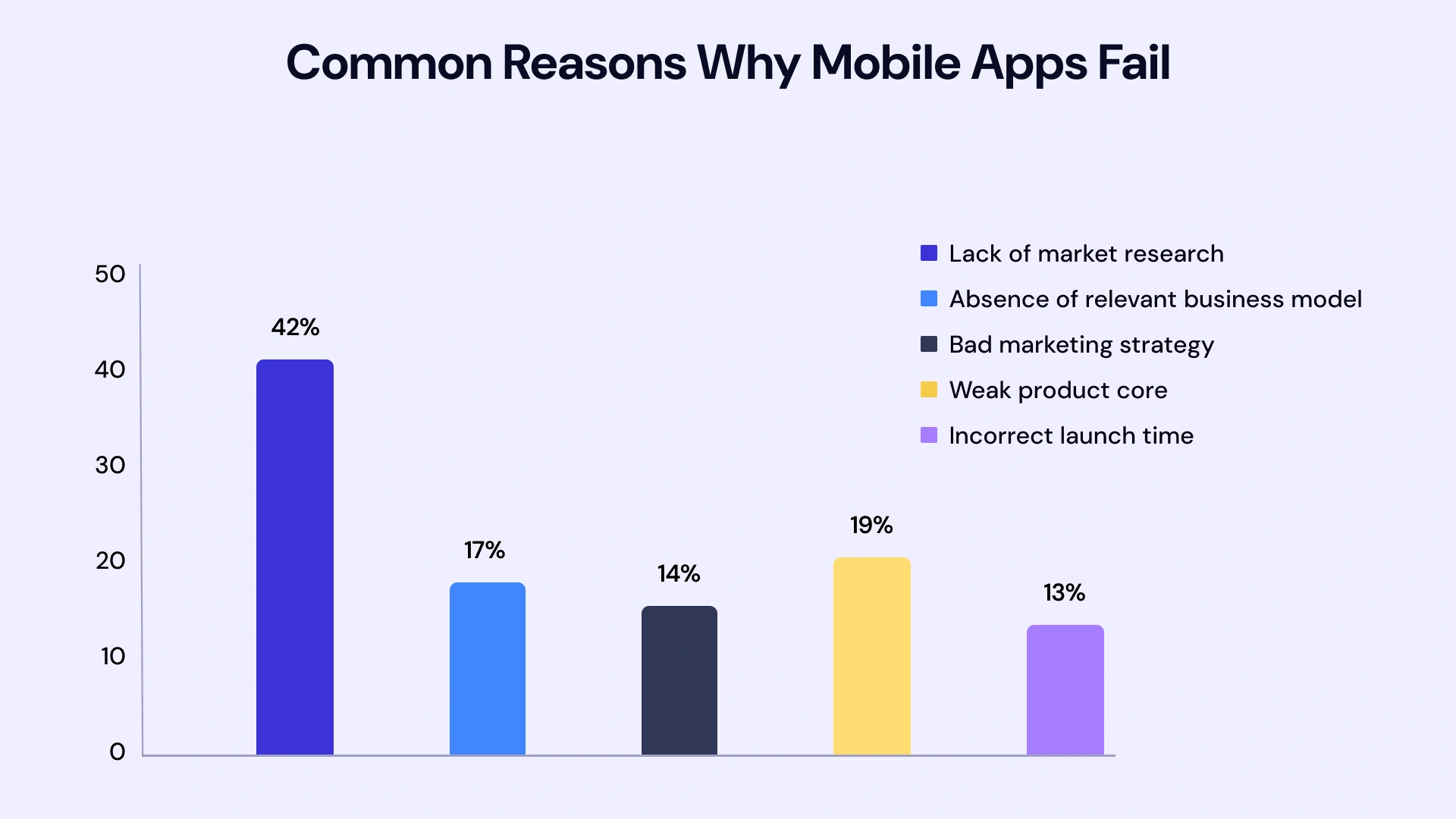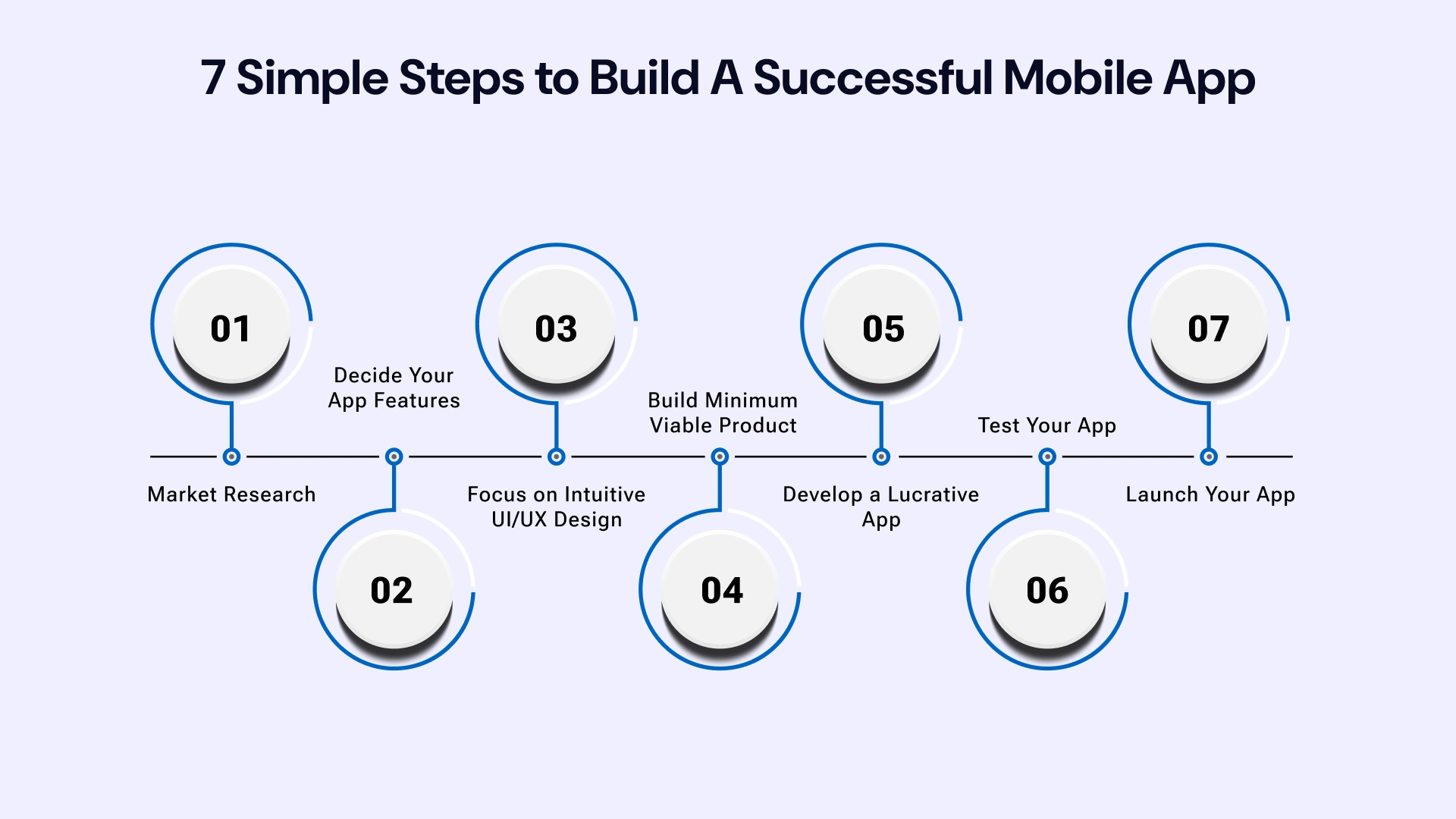The mobile app development segment is growing at a massive rate. Investing in a user-friendly mobile app is a golden opportunity for businesses in this ever-evolving digital era.
According to Data, after hitting the $161.12 bn mark in revenue in 2022, the global mobile apps revenue in 2030 will reach a new milestone – $793.31 bn. It’s no surprise because many SMEs and startups prefer building mobile apps to help them reach new potential customers.

So, you wake up in the morning with a brilliant idea for a mobile app; it’s time to convert it into your visual reality. Creating a mobile app that fits your vision could help you build brand loyalty, improve customer relationships and stay competitive.
But the concern is how to build a successful mobile app for your business.
This blog will explore a comprehensive guide on the mobile app development process for businesses. However, you first need to know a little bit about mobile apps.
What is Mobile App Development?
Mobile app development is the process of creating custom and feature-rich software for smartphones. It involves features installation, backend services implementation and app testing applications.
In brief, app development is the strategic process of successfully designing, developing and launching a mobile application.
Different Types of Mobile App Development?
There are several types of mobile apps, such as Native, hybrid, web and progressive web applications.
Let us tackle each of these in the following table.
Key Components | Native Apps | Hybrid Apps | Web Apps | Progressive Web Apps |
Tech Stacks | C++ Java Kotlin Objective-C Python React Native Swift | CSS Flutter HTML5 Ionic PhoneGap React Native Xamarin | PHP Python Ruby TypeScript C++ CSS HTML5 JS | AngularJS CSS HTML5 JS VueJS |
Pros | Better performance Improved Scalability Enhanced UX | Low cost Quicker build Use one codebase | Low cost Easy to maintain Automatic updates | No installation required More efficient Versatility |
Cons | Time-Consuming Need separate codebase | Higher complexity | Less functionality Poor UX | Complex hardware integration |
Popular Examples | Google Maps, Pokemon Go, Whatsapp | Facebook, Gmail, Instagram | Amazon, MS Office, Netflix | Pinterest, Starbucks, Tinder |
Incredible Statistics That Prove Why Your Business Needs a Mobile App
The number of app user, as shown below image:

So, it's no surprise that the mobile app industry is thriving, and app development is important for businesses. Here are some statistics proving why your business needs to create a user-friendly Android or iOS application.
Also Read about iOS app development to let your business grow at full potential.
According to Data:
- IOS leads the way in the US market with a 55.85% market share. While Android holds a massive 41.89% market share.
- There will be more than 64 bn IoT devices by 2025.
- The smartphone users spending on 9-10 apps daily and 30 apps monthly.
- There are 1.96 million apps on the Apple App Store and 2.87 million on Google Play Store available for download.
These were some facts and figures picked to help you understand how having a mobile app can benefit your business growth.
But did you know 99.5% of mobile apps fail?
Shocked?
It's a fact that creating successful mobile applications for both Android & iOS platforms is not as easy as it seems. You first need to understand the major reasons for mobile app failure.
Why Mobile Apps Fails and How to Prevent Them?

Reason#1 - Shortage of Market Study
Mobile apps that don't mark your target market's needs will not enjoy sufficient downloads. According to data, 80 to 90% of apps downloaded are dropped after first use.
How to prevent the letdown?
Conduct detailed market research to understand your target audience, their online behavior and buying patterns. It will help you build applications that meet your goals and customer needs.
What's more?
Do a competitor analysis to strengthen your mobile strategy and connect your idea with your audience.
Reason #2 - Lack of a Robust Business Model
A wrong business model can majorly cause your app's failure. You must be creative and innovative to build mobile apps according to your audience's needs. You should also know your application's selling point, features and factors that make you better than your competitors.
Properly defined goals are essential in mapping out a robust mobile app strategy and business model.
Reason #3 - Confusing App Design
Users might ditch your app if its design and usability are not user-friendly. Poor coding and outdated design can cause epic failure.
Solution?
User-Friendly and appealing designs bring happy and loyal customers. With end-to-end testing, ensure your app is bug-free and intuitive.
Reason #4 - Failure to Market Your App
Imagine you have developed a user-friendly and intuitive app, but your app has failed.
The reason is you don’t market your app rigorously.
How to do this?
- Have a crystal-clear marketing strategy that define your target audience
- Deliver your message via the right channels
- Helps customers realize how they can benefit from your software
- Offer discounts to attract more users
How To Build Successful Mobile Applications?
Here are steps crucial to your app's success, so don't skip over them.

Market Research
When creating mobile apps for your startup, it's essential to conduct research and analysis of your target market. It will help you understand how consumers interact with brands.
You can also check user reviews for successful apps in the market for better results. Study your users' location, average age and devices to understand your target audience.
Decide Your App Features
Make sure your app has relevant features. You need to identify the best features for your users.
Always remember that adding unnecessary features (whether it's popular) into your app may frustrate your users.
In addition, more features mean increased cost and lengthy mobile development time. So, you need to focus on simplicity in the first development stages.
Focus on Initutive UI/UX Design
One of the most common parts of successful app development is the impeccable UI/UX design.
No matter which successful mobile app you choose, Instagram, Netflix, or Snapchat - you will find intuitive UI/UX design is an essential part of them.
Ensure your app is eye-catchy, usable and functional. Plus, it should meet Google Material Design standards and Apple's Human Interface Guidelines.

Build Minimum Viable Product
MVP (Minimum Viable Product) is an app version with key features.
Determining how millions of app users accept your idea is essential before investing into scaling it to the next level. That's where MVP app development plays a vital role!
MVP gives a clear idea of the app's worth at a low development cost and the efforts required to make an app successful.
Even most top-notch brands started as MVP Development, such as Twitter, Airbnb & Spotify.
Develop a Lucrative Application
Once you are done with research, outlined UI/UX design and defined MVP, you can integrate tech stacks and begin the core development process.
This stage relies on your choice of development method or software.
For example, If you select custom mobile application development, you must start the coding process.
But with automated tools and software, you just need to fill your requirements, begin low-code programming or continue with a no-code drag-and-drop app builder.
Based on the project nature, this phase may get divided into three segments:
- Front-end development (design, architecture, features and interface)
- Back-end development (system architecture, databases, servers, & security)
- API integration
Test Your App
Proper testing helps reduce the development cost and time and identifies bugs, ultimately making your apps successful.
Test everything related to your mobile app, from performance to user experience.
Launch Your App
After successful testing, it's time to launch your app to the Play Store or Apple's App Store. However, you must first comply with Google and Apple's developer guidelines.
In addition, you need to align your monetization strategy to your customers' perceptions to boost your bottom line!
How Much Does Mobile App Development Cost?
One of the most important parts on which a business's entire app development journey relies is the cost of building a successful mobile application.
In a nutshell, mobile app development price tag ranges somewhere from $25,000 to $200,000.
On the other hand, custom app development costs depend on different factors;
- Purpose of the app
- Platform
- Complexity level
- App development agency size
- Geographical location
Also, you can learn about the exact cost breakdown structure of how much it costs for mobile app development and maintenance.
What is the Future of Mobile App Development?
The future of mobile application development is promising & exciting. With the rise of 5G, AR & VR, AI & ML, Blockchain and cloud-based devices, the coming years promise to be transformative for app development.
To stay competitive, you must keep up with new trends and practices.
5 Mobile App Development Trends to Watch Out
AR & VR
Top AR (Augmented Reality) use cases in mobile applications continue their upward trend in 2023. Its users' number will reach 1.73 bn by the end of 2024.
AR is transforming the retail industry, healthcare business, educational institutions, e-commerce companies and industrial manufacturing units.
Like Augmented Reality, Virtual Reality is also revolutionizing mobile app development by enhancing user experience and improving the performance of applications.
29% of manufacturers reported a surge in their productivity and efficiency after implementing AR/VR technology.
AI & ML
Artificial Intelligence (AI) & Machine Learning (ML) is the latest mobile app development trend worth watching in coming years. This technology could stand in future application development in facial and speech recognition.
Businesses, especially in the financial sectors, can use AI/ML development solutions to improve user safety and data security and help identify fraud.
According to McKinsey, the potential annual value of AI for global banks is over $1 trillion.
Predictive Analytics
Predictive analytics is a ground-breaking trend in mobile app development, driven by widespread advanced technologies such as AI/ML, & big data to predict events using data.
The global predictive analytics market is projected to exceed $44.3bn by 2030.
For example, Netflix uses predictive analytics to recommend users web series based on their previous watching experience.
Depending on your data, predictive analytics can estimate your app's development cycle duration, & expect bugs. As a result, it will minimize the development risk and increase your ROI.
IoT
With the rise of the Internet of Things, the number of connected devices is increasing daily. IoT market value was $478.36 billion in 2022 and is projected to reach $2,465.26 billion by 2029.
Many consumers are using IoT services to monitor their devices from smartphones.
5G
5G technology will transform the way people use mobile apps. By 2024, it's predicted that the number of 5G smartphone connections will reach 1,478.7 million, three times more than that in 2022.
5G will drastically increase applications' speed and efficiency, allowing programmers to integrate new features without risking their performance. This technology will boost network efficiency and traffic capacity by reducing latency.
How Can VLink Help in Your Mobile App Development Projects?
At VLink, we have worked on numerous unique and innovative projects to help businesses build applications that customers would embrace.
For instance, we helped our client Health Dialog to create an innovative healthcare mobile app that monitors conditions and promotes wellness.
We also customized this app to address several diseases or to track a variety of illnesses and high blood pressure or obesity easily and quickly.
For another client retail company, we built a retail mobile shopping app that would be seamlessly compatible with any device and browser with features for secure payment and outstanding user experience.
So, if you're also looking to develop a successful mobile app, feel free to contact us. We will be delighted to help you!









 Shivisha Patel
Shivisha Patel

















